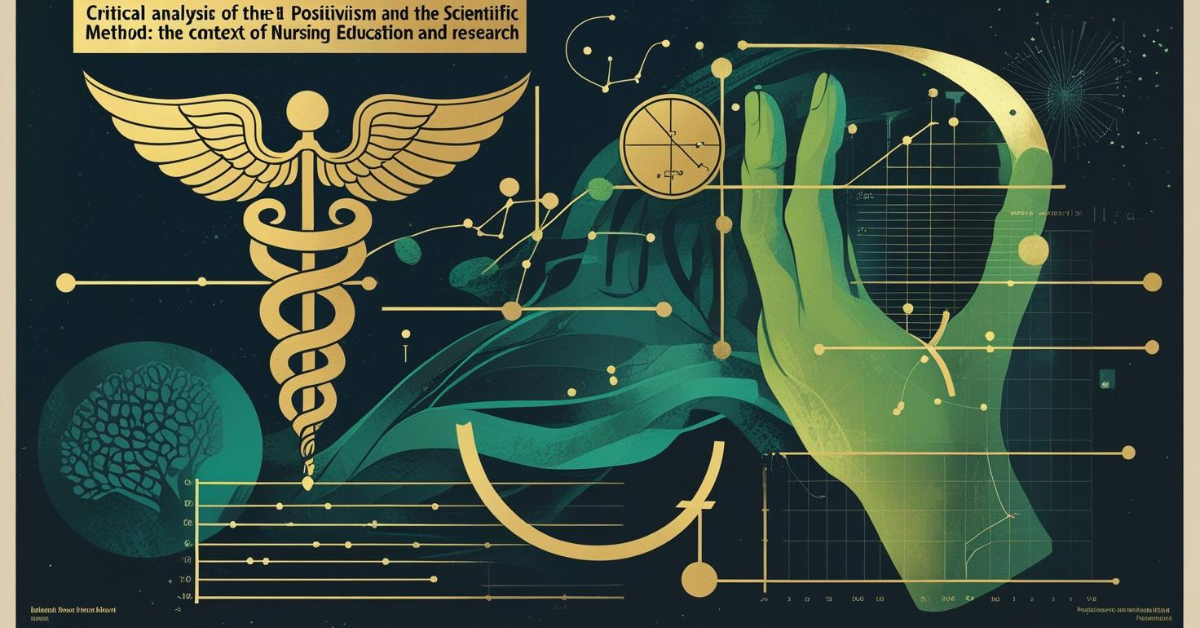What Is Criticisms of Positivism and the Scientific Method In Nursing Education and Research. In short, while positivism and scientific methods have significantly contributed to nursing knowledge, it is crucial to recognize their limitations and consider alternative perspectives to ensure a holistic and nuanced understanding of nursing practice and patient care.
The Criticisms of Positivism and the Scientific Method In Nursing Education and Research
While positivism and scientific methods constitute the foundation of nursing education and research, they have been criticized for being reductionist, neglecting the subjective and qualitative aspects of the human experience, and potentially overlooking the complexity of real-life nursing practice.
Nurses and nurse researchers must develop critical appraisal skills to assess the strengths and weaknesses of different research approaches and integrate diverse perspectives into their practice. Combining quantitative and qualitative methods (mixed methods research) can allow for a more complete understanding of complex nursing phenomena.
Revolt Against Positivism
In spite of the scientific enterprise’s proven success—especially in the field of natural science— its ontological and epistemological bases have been the focus of sustained and sometimes vehement criticism from some quarters. Beginning in the second half of the nineteenth century, the revolt against positivism occurred on a broad front, attracting some of the best intellectuals in Europe—philosophers, scientists, social critics and creative artists.
Essentially, it has been a reaction against the world picture projected by science which, it is contended, undermines life and mind. The precise target of the anti-positivists’ attack has been science’s mechanistic and reductionist view of nature which, by definition, excludes notions of choice, freedom, individuality, and moral responsibility.
Blake’s Living Universe: The Mechanistic Challenge
One of the most sustained and consistent at tacks in this respect came from the poet, William Blake, who perceived the universe not as a mechanism, but as a living organism: Blake would have us understand that mechanistic science and the philosophy of material ism eliminate the concept of life itself.
All they can do is to define life in terms of biochemistry, biophysics, vibrations, wavelengths, and so on; they reduce ‘life’ to conceivable measurement, but such a conception of life does not embrace the most evident element of all: that life can only be known by a living being, by ‘inner’ experience. No matter how exact measurement may be, it can never give us an experience of life, for life cannot be weighed and measured on a physical scale. (Nesfield-Cookson, 1987).
Kierkegaard’s Existentialist Challenge
Another challenge to the claims of positivism came from Soren Kierkegaard, the Danish philosopher, from whose work was to originate the movement that became known as Existentialism. Kierkegaard was concerned with individuals and their need to fulfill themselves to the highest level of development. This realization of a person’s potential was for him the meaning of existence which he saw as ‘concrete and individual, unique and irreducible, not amenable to conceptualization’ (Beck, 1979).
Characteristic features of the age in which we live—democracy’s trust in the crowd mentality, the ascendancy of reason, scientific and technological progress—all militate against the achievement of this end and contribute to the dehumanization of the individual.
In his desire to free people from their illusions, the illusion Kierkegaard was most concerned about was that of objectivity. By this he meant the imposition of rules of behavior and thought, and the making of a person into an observer set on discovering general laws governing human behavior. The capacity for subjectivity, he argued, should be regained. This he regarded as the ability to consider one’s own relationship to whatever constitutes the focus of inquiry.
Objectivity vs. Subjectivity
The contrast he made between objectivity and subjectivity is brought out in the following passage: When the question of truth is raised in an objective manner, reflection is directed objectively to the truth as an object to which the knower is related. Reflection is not focused on the relationship, however, but upon the question of whether it is the truth to which the knower is related. If only the object to which he is related is the truth, the subject is accounted to be in the truth.
When the question of truth is raised subjectively, reflection is directed subjectively to the nature of the individual’s relationship; if only the mode of this relationship is in the truth, the individual is in the truth, even if he should happen to be thus related to what is not true. (Kierkegaard, 1974) For Kierkegaard, ‘subjectivity and concreteness of truth are together the light. Anyone who is committed to science, or to rule-governed morality, is benighted, and needs to be rescued from his state of darkness’ (Warnock, 1970).
Dehumanization Problem
Also concerned with the dehumanizing effects of the social sciences is Ions (1977). While acknowledging that they can take much credit for throwing light in dark corners, he expresses serious concern at the way in which quantification and computation, assisted by statistical theory and method, are used. On this point, he writes: The argument begins when we quantify the process and interpret the human act. In this respect, behavioral science represents a form of collectivism which runs parallel to other developments this century.
However high-minded the intention, the result is depersonalization, the effects of which can be felt at the level of the individual human being, not simply at the level of culture. (Ions, 1977) His objection is not directed at quantification per se, but at quantification when it becomes an end in itself—‘a branch of mathematics rather than a humane study seeking to explore and elucidate the gritty circumstances of the human condition’ (Ions, 1977). This echoes Horkheimer’s (1972) powerful critique of positivism as the ‘mathematication of nature’.
Alienated Consciousness and Mathematical Reductionism
Another forceful critic of the objective consciousness has been Roszak. Writing of its alienating effect in contemporary life, he says: While the art and literature of our time tell us with ever more desperation that the disease from which our age is dying is that of alienation, the sciences, in their relentless pursuit of objectivity, raise alienation to its apotheosis as our only means of achieving a valid relationship to reality.
Objective consciousness is alienated life promoted to its most honorific status as the scientific method. Under its auspices we subordinate nature to our command only by estranging ourselves from more and more of what we experience, until the reality about which objectivity tells us so much finally becomes a universe of congealed alienation. (Roszak, 1970).
Bankruptcy of Positivism
The justification for any intellectual activity lies in the effect it has on increasing our awareness and degree of consciousness. This increase, some claim, has been retarded in our time by the excessive influence the positivist paradigm has been allowed to exert on areas of our intellectual life.
Holbrook, for example, affording consciousness a central position in human existence and deeply concerned with what happens to it, has written: Our approaches today to the study of Mansic have yielded little, and are essentially dead, because they cling to positivism—that is, to an approach which demands that nothing must be regarded as real which cannot be found by empirical science and rational methods, by ‘objectivity’.
Since the whole problem…belongs to ‘psychic reality’, to man’s ‘inner world’, to his moral being, and to the subjective life, there can be no debate unless we are prepared to recognize the bankruptcy of positivism, and the failure of ‘objectivity’ to give an adequate account of existence, and are pre pared to find new modes of inquiry. (Holbrook, 1977)
Misleading Picture of Human Nature
Other writers question the perspective adopted by positivist social science because it presents a misleading picture of the human being. Hampden-Turner (1970), for example, concludes that the social science view of human beings is biased in that it is conservative and ignores important qualities.
This restricted image of humans, he contends, comes about because social scientists concentrate on the repetitive, predictable and invariant aspects of the person; on ‘visible externalities’ to the exclusion of the subjective world; and—at least as far as psychology is concerned—on the parts of the person in their endeavors to understand the whole. For a trenchant critique of science from the point of view of theology, see Philip Sherrard (1987), The Eclipse of Man and Nature.
Critical Theory and Scientism
Habermas (1972), in keeping with the Frankfurt School of critical theory (critical theory is discussed below), provides a corrosive critique of positivism, arguing that the scientific mentality has been elevated to an almost unassail able position—almost to the level of a religion (scientism)—as being the only epistemology of the west. In this view all knowledge becomes equated with scientific knowledge. This neglects hermeneutic, aesthetic, critical, moral, creative and other forms of knowledge.
It reduces behavior to techniques. Positivism’s concern for control and, thereby, its appeal to the passivity of behaviorism and for instrumental reason is a serious danger to the more open-ended, creative, humanitarian aspects of social behavior. Habermas (1972, 1974) and Horkheimer (1972) are arguing that scientism silences an important debate about values, informed opinion, moral judgments and beliefs.
Scientific explanation seems to be the only means of explaining behavior, and, for them, this seriously diminishes the very characteristics that make humans human. It makes for a society without conscience. Positivism is unable to answer questions about many interesting or important areas of life (Habermas, 1972:300). Indeed this is an echo of Wittgenstein’s (1974) famous comment that when all possible scientific questions have been addressed they have left untouched the main problems of life.
Internal Criticisms from Social Science
Other criticisms are commonly leveled at positivistic social science from within its own ranks. One is that it fails to take account of our unique ability to interpret our experiences and represent them to ourselves. We can, and do construct theories about ourselves and our world; moreover, we act on these theories. In failing to recognize this, positivistic social science is said to ignore the profound differences between it and the natural sciences.
Subject-Subject Problem
Social science, unlike natural science, ‘stands in a subject—subject relation to its field of study, not a subject—object relation; it deals with a pre-interpreted world in which the meanings developed by active subjects enter the actual constitution or production of the world’ (Giddens, 1976). The difficulty in which positivism finds itself is that it regards human behavior as passive, essentially determined and controlled, thereby ignoring intention, individualism and freedom.
This approach suffers from the same difficulties that inhere in behaviorism, which has scarcely recovered from Chomsky’s withering criticism in 1959 where he writes that a singular problem of behaviorism is our inability to infer causes from behavior, to identify the stimulus that has brought about the response—the weakness of Skinner’s stimulus-response theory.
Agency vs. Structure Tension
This problem with positivism also rehearses the familiar problem in social theory, viz. the tension between agency and structure (Layder, 1994); humans exercise agency—individual choice and intention—not necessarily in circumstances of their own choosing, but nevertheless they do not behave simply, deterministically like puppets.
Banality of Laboratory Findings
The findings of positivistic social science are often said to be so banal and trivial that they are of little consequence to those for whom they are intended, namely, teachers, social workers, counsellors, personnel managers, and the like. The more effort, it seems, that researchers put into their scientific experimentation in the laboratory by restricting, simplifying and control ling variables, the more likely they are to end up with a ‘pruned, synthetic version of the whole, a constructed play of puppets in a restricted environment’.
Formidable Criticisms and Future Alternatives
These are formidable criticisms; but what alternatives are proposed by the detractors of positivistic social science?
Read More:
https://nurseseducator.com/didactic-and-dialectic-teaching-rationale-for-team-based-learning/
https://nurseseducator.com/high-fidelity-simulation-use-in-nursing-education/
First NCLEX Exam Center In Pakistan From Lahore (Mall of Lahore) to the Global Nursing
Categories of Journals: W, X, Y and Z Category Journal In Nursing Education
AI in Healthcare Content Creation: A Double-Edged Sword and Scary
Social Links:
https://www.facebook.com/nurseseducator/
https://www.instagram.com/nurseseducator/
https://www.pinterest.com/NursesEducator/
https://www.linkedin.com/in/nurseseducator/
https://www.researchgate.net/profile/Afza-Lal-Din
https://scholar.google.com/citations?hl=en&user=F0XY9vQAAAAJ


